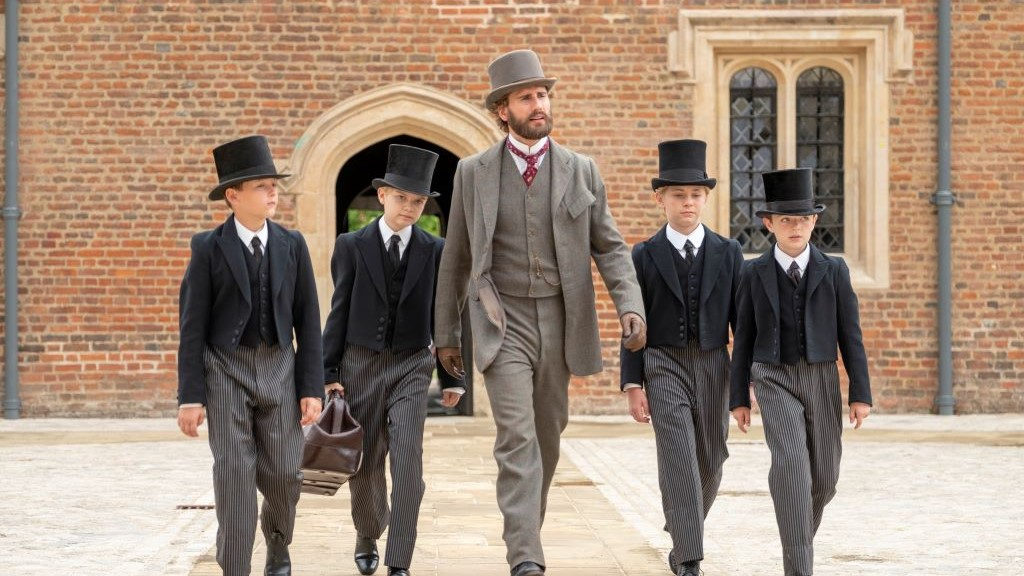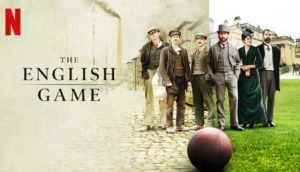The English Game

With football removed from the scene in the current climate, Netflix brings us what it hopes will be the plug to fill the hole left behind by the sporting kingdom. With aid of famed writer and actor Julian Fellowes, who has in the past brought such period wonders as Gosford Park and Downton Abbey, the streaming service presents The English Game, an historical drama about the origins of the beautiful game in the United Kingdom, focusing on the latter years of the 19th century when what was considered a “gentlemen’s game” was evolving into a sport for all.
The English Game explores the relationships and lives of two key figures of the era who bridged the social and class divide in the name of football: Arthur Kinnaird (Edward Holcroft), a man of wealthy upbringing who captained the Old Etonians and was a member of the Football Associations board, and Fergus Suter (Kevin Guthrie), a Scottish player who was paid to play for the Lancashire mill town teams Darwin FC and Blackburn Rovers. Suter’s dream is to win the FA Cup and show the country that football is no longer just a sport for wealthy men, but for some of his factory-working teammates, there is more to life than just winning matches. There is another game called politics at play, with worker walkouts, riots and union meetings fighting the oppression the working class suffers. Money really does begin to talk in the English game. For Arthur, the only answer is to share what the elites already have, for the good of the game and society itself.
A six-part series, The English Game is a fascinating, albeit not entirely historically accurate, journey into the past, exploring two very different societies in the late 1800s and contrasting how terribly uneven their environments were. The sports field was one of a very few ways in which all could be represented equally, much to the distaste of some. Fellowes focuses largely on the sporting storyline, but also applies his own touch, making the script bulkier with class struggles and inequality as he does best. There are some characters and scenes inserted into the plot with the likely aim of simply creating a more complex screenplay, but nonetheless each factor pieces together into a rather satisfactory jigsaw.
Holcroft is brilliantly cast as the famous Kinnaird, playing the youthful incarnation of the man who would become one of football’s heroes with conviction, vigour and heart, understanding the liberal morals that his character imposed on the sport perfectly. Guthrie also steps up to the plate, presenting Suter as the working man’s hero and the character that the viewer should root for. His character’s personality and those of Kinnaird’s teammates are slightly clichéd – the action frequently suggests that this is simply toffs versus the working man – but it must be assumed that this is simply a method of amplifying Kinnaird’s importance.
All in all, the series is fun, and if you are seriously missing football in your life at the moment, The English Game may well quench your thirst for now. The matches themselves provide the series’s most exciting moments, but there is still a romanticised enticement in the costumes, relationships, sets and subplots to keep the episodes rolling along. You can race through the show in a matter of hours, with running times ranging from 43 to 55 minutes, and if nothing else, it can simply be enjoyed as a history lesson about a sport that now towers above all others in British and international society. The series could have been longer, but this lack of further viewing suggests that a second season will kick off in due course, as there is a sizeable amount of rich content on offer from that moment in time.
Guy Lambert
The English Game is released digitally on Netflix on 20th March 2020.
Watch the trailer for The English Game here:
























Facebook
Twitter
Instagram
YouTube
RSS